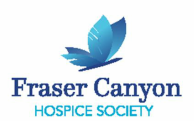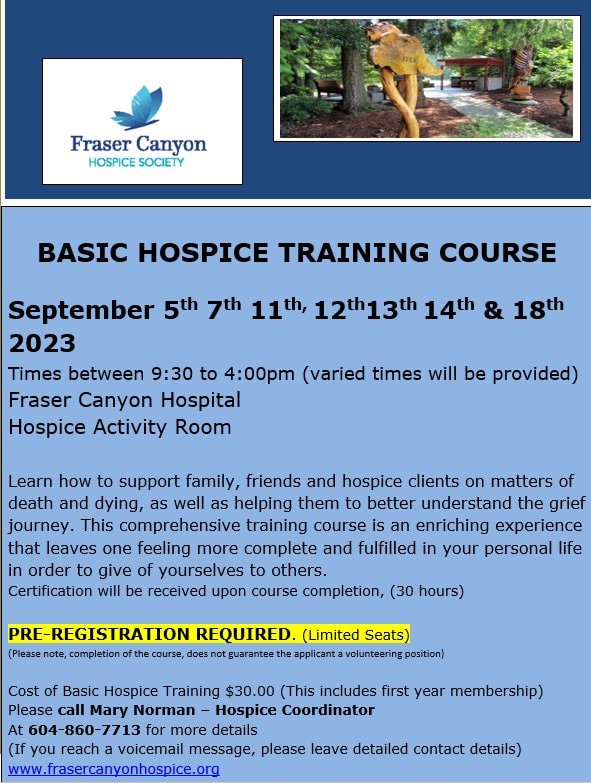Basic Hospice Volunteer training:
Curriculum
Our material is combined from British Columbia Hospice Palliative Care Association The BCHPCA https://bchpca.org
Volunteer Standards and Hospice Training Program, Association for Volunteer Resources BC, Victoria Hospice Society, Chilliwack Hospice Society and Volunteer Canada. Topics covered include an Introduction and History to Hospice Palliative Care and FCHS Programs, Best Practices of a Hospice Volunteer, Meeting the Hospice Palliative Care Team; Pain Management; Psycho social Care for the Dying and Bereaved; Communication and Healthy Boundaries; an Introduction to Complementary Therapies, Self-Care and Relaxation; Loss, Grief and Bereavement; Family Dynamics; Children’s Grief; Spiritual Care and Cultural Diversity.
We offer a dynamic program which caters to a variety of learning styles and abilities. Activities include group work, role playing, case studies, presentations, self-reflections, videos, self-care techniques and discussions. As a member of Fraser Canyon Integrated Health Team we work closely with our First Nations liaisons to promote inclusion in our programs and teach our volunteers of First Nations traditions at end-of-life.
Our program include an array of guest speakers such as Hospice Palliative Care physicians, clinicians, home health nurses, social worker and occupational therapists; First Nations liaisons; and spiritual care practitioners.
Is the program beneficial to volunteers of other organizations?
The benefit of this training is that our participants are fully equipped with the knowledge and tools for volunteering in any setting where they will work with other people. It is also a very useful introduction to volunteer boundaries, policies and expectations. Through our detailed evaluations and interviews volunteers have informed us that they have learned (for both their volunteer roles and also their personal lives) how to better listen, to grow as individuals, to be comfortable with death and dying and the difficult conversations with dying persons, to explore their spirituality and overall health, to better care for themselves so they can support others, the importance of Advanced Care Planning, to better communicate, to set boundaries, relaxation techniques, and understand our First Nations Communities.
Curriculum
Our material is combined from British Columbia Hospice Palliative Care Association The BCHPCA https://bchpca.org
Volunteer Standards and Hospice Training Program, Association for Volunteer Resources BC, Victoria Hospice Society, Chilliwack Hospice Society and Volunteer Canada. Topics covered include an Introduction and History to Hospice Palliative Care and FCHS Programs, Best Practices of a Hospice Volunteer, Meeting the Hospice Palliative Care Team; Pain Management; Psycho social Care for the Dying and Bereaved; Communication and Healthy Boundaries; an Introduction to Complementary Therapies, Self-Care and Relaxation; Loss, Grief and Bereavement; Family Dynamics; Children’s Grief; Spiritual Care and Cultural Diversity.
We offer a dynamic program which caters to a variety of learning styles and abilities. Activities include group work, role playing, case studies, presentations, self-reflections, videos, self-care techniques and discussions. As a member of Fraser Canyon Integrated Health Team we work closely with our First Nations liaisons to promote inclusion in our programs and teach our volunteers of First Nations traditions at end-of-life.
Our program include an array of guest speakers such as Hospice Palliative Care physicians, clinicians, home health nurses, social worker and occupational therapists; First Nations liaisons; and spiritual care practitioners.
Is the program beneficial to volunteers of other organizations?
The benefit of this training is that our participants are fully equipped with the knowledge and tools for volunteering in any setting where they will work with other people. It is also a very useful introduction to volunteer boundaries, policies and expectations. Through our detailed evaluations and interviews volunteers have informed us that they have learned (for both their volunteer roles and also their personal lives) how to better listen, to grow as individuals, to be comfortable with death and dying and the difficult conversations with dying persons, to explore their spirituality and overall health, to better care for themselves so they can support others, the importance of Advanced Care Planning, to better communicate, to set boundaries, relaxation techniques, and understand our First Nations Communities.


